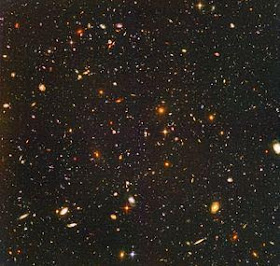Bridging is, in part, the story of the search for a young girl who has disappeared off the streets of Baltimore and is believed to have been abducted. Members of the girl's family as well as those involved in the search are forced to confront the tension between a secular view of life which offers no ground for thinking any act "evil" and the obvious evil of which some men are capable.
Here's an excerpt from the Prologue:
In 1948 philosopher W.T. Stace wrote an article for The Atlantic Monthly, a portion of which serves as an appropriate introduction to the story which follows in these pages. Stace wrote:If you'd like to read more about either novel click on the link at the top of this page, and if you're looking for a gift for someone who likes to read and who thinks like W.T. Stace, both Absence and Bridging might be just the thing. I hope you'll give them a look. They're available at Hearts and Minds Bookstore, a great little family-owned bookshop, and in both paperback and e-book at Amazon and Barnes and Noble."The real turning point between the medieval age of faith and the modern age of unfaith came when scientists of the seventeenth century turned their backs upon what used to be called "final causes" …[belief in which] was not the invention of Christianity [but] was basic to the whole of Western civilization, whether in the ancient pagan world or in Christendom, from the time of Socrates to the rise of science in the seventeenth century …. They did this on the [basis that] inquiry into purposes is useless for what science aims at: namely, the prediction and control of events.
"…The conception of purpose in the world was ignored and frowned upon. This, though silent and almost unnoticed, was the greatest revolution in human history, far outweighing in importance any of the political revolutions whose thunder has reverberated around the world….
"The world, according to this new picture, is purposeless, senseless, meaningless. Nature is nothing but matter in motion. The motions of matter are governed, not by any purpose, but by blind forces and laws….[But] if the scheme of things is purposeless and meaningless, then the life of man is purposeless and meaningless too. Everything is futile, all effort is in the end worthless. A man may, of course, still pursue disconnected ends - money, fame, art, science - and may gain pleasure from them. But his life is hollow at the center.
"Hence, the dissatisfied, disillusioned, restless spirit of modern man….Along with the ruin of the religious vision there went the ruin of moral principles and indeed of all values….If our moral rules do not proceed from something outside us in the nature of the universe - whether we say it is God or simply the universe itself - then they must be our own inventions.
"Thus it came to be believed that moral rules must be merely an expression of our own likes and dislikes. But likes and dislikes are notoriously variable. What pleases one man, people, or culture, displeases another. Therefore, morals are wholly relative."
This book, like my earlier novel In the Absence of God, is a story of people living in the wake of the revolution of which Stace speaks. It's a portrait of a small slice of modern life, a glimpse of what it is like to live in a world in which men live consistently, albeit perhaps unwittingly, with the assumptions of modernity, chief among which is the assumption that God does not exist or is in any case no longer relevant to our lives.
A world that has marginalized the God of the Judeo-Christian tradition is a world which finds itself bereft of any non-arbitrary basis for forming moral judgments, for finding any ultimate meaning in the existence of the human species as a whole or the life of the individual in particular, and for hope that the human yearning for justice could ever be satisfied.
Modern man dispenses with God and believes that life can go on as before - or even better than before - but this is a conceit which the sanguinary history of the 19th and 20th century confutes. A world that has abandoned God has abandoned the fountain of goodness, beauty and truth as well as the only possible ground for human rights and belief in the dignity of the individual.
Modernity has in some ways of course been a blessing, but it has also been a curse. History will ultimately decide whether the blessings have outweighed the curse. Meanwhile, Bridging the Abyss offers an account of what I believe to be the only way out of the morass into which widespread acceptance of the assumptions of modernity has led us.


